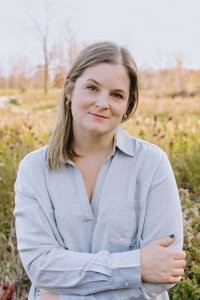Grace Ostrosky & Zoe Ward, Asst. Arts & Life Editor & Special to The Denisonian–
“Writing is a profound act of hope,” Professor Amy Butcher stated, “and resistance.”
Butcher presented at the Beck Series on Jan. 30, supported by an audience of professors, former and current students, friends, and community members. The event took place at the Denison Museum, whose Ohio Indigenous Art Exhibit provided the reading a vivid landscape populated with lithographs and ceramics. Butcher, the newest member of Denison’s creative writing faculty, took the microphone to share about her newest book “Mothertrucker” and its message about Alaska’s only female ice truck driver, the deadliest road in America, and intimate partner violence.
Dr. Margot Singer introduced Butcher, expressing that Butcher stood out among 100 applicants, many of whom had books, tenured positions, and prestigious publications.
“When she arrived on campus with her warm smile and can-do attitude, we knew,” said Singer. Singer provided a primer to the genre of creative nonfiction–which Butcher writes and teaches–defining it as “honoring complexity.” She extolled Butcher’s work as “trepid,” “honest” and “brave.”
Butcher took the podium, explaining that normally when a reader reads their work, the listeners have to do the imaginative work. Yet she saw this reading as an opportunity to share about the process of writing “Mothertrucker” through photos and videos. “Not every writer has photos and videos of trekking up the deadliest road in America with a stranger they met on the Internet,” she laughed.
Butcher introduced the audience to the woman featured in her book: Joy Wiebe, or as known on Instagram as @alaskamothertrucker. Wiebe was the only female truck driver on Alaska’s James W. Dalton Highway, a road she called “downright holy.” The Dalton Highway has been described as “the loneliest road in America,” yet it is also one of the most dangerous. “One travels,” Butcher stated, “at one’s own risk.”
The frequent blizzards, lack of repairs, and inaccessibility to tow trucks and police makes the highway treacherous for even seasoned drivers. Butcher described the beauty of the atmosphere despite its threatening nature. She showed a video of a red fox scurrying over blindingly white tundra, then a slightly blurry photo of Joy and Butcher, captured by a phone timer. Butcher revealed that part of what she loved about that photo of the two of them was the sundog, or when moisture in the air catches sunlight and looks like little rainbows. Butcher also explained that due to the distance from society’s security, truckers help other truckers on the highway. As a thank you, truckers pay it forward via meal tickets.
Three weeks before Butcher was set to return to Alaska to ride with Wiebe again, Wiebe was killed in an accident. Butcher returned to Alaska for Wiebe’s funeral and trucker convoy, a procession that honored the female driver. The many attendees honored Wiebe’s kindness and zest for life and trucking; she was known as a “highway angel” for all of her work helping others on the road.
“Sometimes we write something and sometimes something writes us,” Butcher stated. She revealed to the audience that while she was riding with Wiebe, she had been in an escalating abusive relationship of her own in Ohio at the time. Wiebe’s sage words coincided with Butcher’s reality. “The strong women,” Wiebe said, “are often strong because they’ve had to be.” Regarding domestic abuse and recovery, Butcher disclosed, “It’s not the story I ever thought I would write, or live…but it’s also a tribute to Joy.”
Butcher stated that writing is an “act of hope for a better world” and that she’s proud to “create work that contributes to the world around us.”

